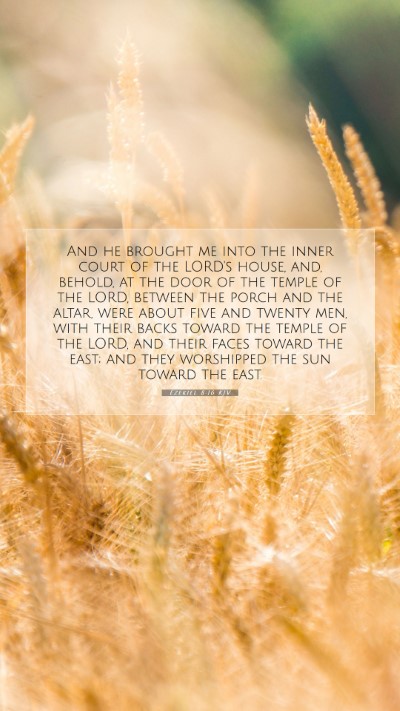Ezekiel 8:16 - Understanding the Meaning of This Bible Verse
The passage from Ezekiel 8:16 reveals a vision given to the prophet Ezekiel, detailing the disturbing practices occurring in the Temple of Jerusalem. This scripture sheds light on Israel's disobedience and the corrupt spiritual state during a critical time in its history.
Bible Verse Explanation
In Ezekiel 8:16, we find Ezekiel observing various individuals within the Temple engaged in idolatrous acts. It states, “And he brought me into the inner court of the Lord’s house, and behold, at the door of the temple of the Lord, between the porch and the altar, were about five and twenty men with their backs toward the temple of the Lord, and their faces toward the east; and they worshipped the sun toward the east.” This verse holds significant implications for understanding the spiritual condition of the Israelite community.
Summary of Insights
-
Matthew Henry's Commentary:
Matthew Henry emphasizes the dire warning of idolatry. He explains that the act of turning their backs on the Temple represents a profound rejection of God’s presence and His commandments. This symbolizes their spiritual blindness and the abandonment of true worship.
-
Albert Barnes' Commentary:
Barnes highlights the gravity of the idolatrous acts taking place within the very heart of Israel’s worship system. He interprets the imagery of worshipping the sun as a stark violation of the first commandments, leading to severe consequences for the nation due to their spiritual compromise.
-
Adam Clarke's Commentary:
Clarke elaborates on the significance of worship directed towards the east, revealing that this act was likely linked to ancient pagan practices. He points out that the idolaters chose not only to neglect their covenant with God but to embrace the customs of surrounding nations. This act exemplified the peril of syncretism, where true faith is mixed with worldly beliefs.
Key Themes and Teachings
-
Idolatry and Rejection of God:
The practical rejection of God’s covenant, embodied in the willingness to engage in idolatrous worship, serves as a warning to believers today about the challenges of maintaining pure faith amidst societal influences.
-
Spiritual Blindness:
This verse serves to highlight the dangers of spiritual complacency and blindness. The leaders and people of Israel were unable to recognize their sinfulness, which made them vulnerable to God’s judgment.
-
The Call for True Worship:
Ezekiel’s vision encourages a return to sincere and genuine worship of the Lord, emphasizing the need for believers to consider their own practices in light of God’s commandments.
Application for Today
When studying this verse, it prompts modern believers to evaluate their own worship practices and discern any influences that may lead them away from a pure relationship with God. It is vital to engage in Bible study tools and resources that encourage a deeper understanding of Scripture and its implications for daily living.
Cross References
- Jeremiah 44:17-19: Discusses the rebellion of the Israelites in worshipping other gods.
- 2 Kings 21:5: Mentions the worship of the host of heaven in the Temple.
- Ezekiel 14:6: A call for repentance from idolatry and a return to God.
Conclusion
Ezekiel 8:16 serves as a powerful reminder of the dangers of idolatry and the importance of maintaining true worship of God. With this understanding, individuals are equipped to engage in effective Bible study groups and online Bible study, seeking deeper insights into scripture interpretation. The meanings of Bible verses require thoughtful consideration that recognizes historical context, spiritual significance, and practical application for today’s followers of Christ.
Understanding difficult Bible passages like Ezekiel 8:16 not only enhances our biblical exegesis but also enriches our spiritual life, guiding us in our daily worship and service to God.


